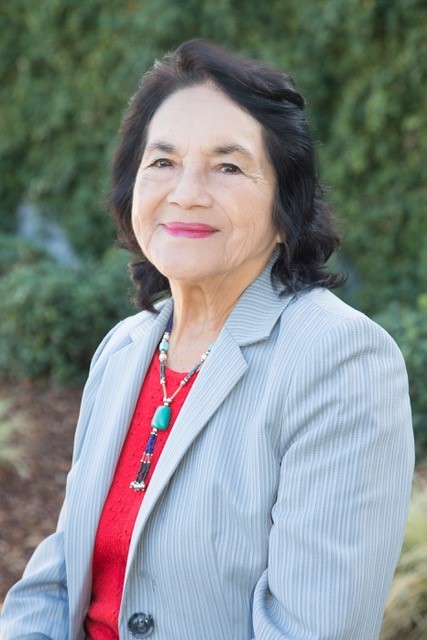By Cynthia Hubert
Labor leader and civil rights hero Dolores Huerta will bring her message of civic engagement and community activism to Sacramento State on Friday, March 13.
Huerta, one of the farm labor movement’s monumental leaders, will speak about the importance of this spring’s national census, which every 10 years seeks to count as many people as possible across the United States. The census determines political representation and equitable distribution of public funds.
 Dolores Huerta, an icon of California's farm labor movement, will emphasize the importance of participating in the upcoming census when she speaks at Sac State on March 13. (Special to Sacramento State)
Dolores Huerta, an icon of California's farm labor movement, will emphasize the importance of participating in the upcoming census when she speaks at Sac State on March 13. (Special to Sacramento State)The lecture, which is free and open to the public, is scheduled for 1:30 p.m. in the University Ballroom. Tickets are limited and registration is encouraged.
“Few people have walked the walk and modeled the power of being civically engaged like Dolores Huerta,” said Viridiana Diaz, Sac State’s assistant vice president for strategic diversity initiatives. “This is an election year and a census year, and youth are powerful voices for creating change.”
Huerta, whose 90th birthday is April 10, spent most of her childhood and early adulthood in Stockton, where her mother Alicia helped mold her into a feminist and activist. Dolores found her calling as a labor organizer while helping to lead the Stockton Community Service Organization. As founder of the Agricultural Workers Association, she set up voter registration drives and pushed for barrio improvements.
Later, along with Cesar Chavez, she launched the National Farmworkers Association. Huerta was instrumental in the enactment of the Agricultural Labor Relations Act of 1975, which for the first time granted farm workers in California the right to collectively organize and bargain for better wages and working conditions. She joined Gloria Steinem and other feminist activists to vigorously challenge gender discrimination and advocate for women’s rights.
Four elementary schools in California, including one in Stockton, are named after Huerta. She has received numerous honors for her work, including the Presidential Medal of Freedom, which President Obama bestowed upon her in 2012. The medal is the highest civilian award in the United States.
At 89, Huerta continues to travel the country to advocate for the working poor, women and children. She is founder and president of the Dolores Huerta Foundation, a nonprofit group that works to train community leaders and promote community organizing and policy advocacy.
At Sac State on March 13, Huerta will discuss the importance and impact of the 2020 census, a topic that the University is highlighting throughout the month.
“Our campus is doing a lot of educating,” Diaz said. “The census is not always the most exciting topic for discussion, but people seem to be engaged and interested in getting involved.”
Among the efforts that the University is using to showcase the census:
- A library exhibit that highlights the importance of including marginalized groups and people who are difficult to count, and demonstrates how census statistics directly affect social and political equity.
- A campus-wide event on March 17 at the University Union and Library Quad featuring student leaders and student organizations touting the importance of census participation.
- Census 101 workshops, which will continue throughout the spring, to give faculty and staff members, administrators and students information and tools for achieving a complete, fair and accurate count of Californians.
In early April, as part of Sac State’s Alternative Spring Break Program, student volunteers will be going door to door to encourage and assist residents in completing their census forms. The University is partnering with Sacramento Area Congregations Together in the effort, said Community Engagement Center Director Dana Kivel.
“It’s so important to be counted, especially in terms of ensuring that California gets access to as much federal funding as possible when needed,” Kivel said.
Organizers of Huerta’s visit hope that her presence on campus will fuel student enthusiasm about such topics.
Huerta’s commitment to equality and to developing tomorrow’s activists make her an ideal role model for Sac State students, many of whom may be unfamiliar with the details of her background, said Lilia Contreras, a social sciences student who is an ambassador for the University’s Serna Center.
“Many students may not understand the extent of her influence,” Contreras said. “But her work is historic. Even at her age, she continues to advocate and make a difference. It’s so important for students to know about her.”
Diaz agreed.
“I want students to look at her and understand how much they are capable of achieving in this world,” she said “If Dolores Huerta was able to achieve what she did, then our students can have an impact too. I want them to know that they can do anything they set their mind to.”
